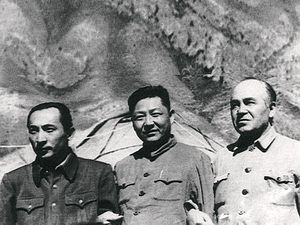On November 16, the New York Times, drawing on leaked documents, reported new details on Xi Jinping’s crackdown on Muslims in Xinjiang. Over the last weekend, the International Consortium of Investigative Journalists published even more material in a similar vein.
Other classified materials available in American libraries, however, demonstrate that the Chinese Communist Party has at other times used a much softer approach toward Xinjiang – and that such policies happen to be most closely associated with Xi’s own father, Xi Zhongxun.
After the Communist victory in 1949, Zhongxun ran the Northwest Bureau, which managed a segment of the country about as big as India, including Xinjiang. The region is full of numerous Muslim peoples, including Uyghurs, Kazakhs, and Hui. In 1949, Zhongxun said, “If it can be said that the Northwest has a defining characteristic, that defining characteristic is ethnic work.”
Incorporating the Northwest into the People’s Republic of China (PRC) was far from peaceful – about 90,000 so-called bandits were eliminated through defeat, surrender, or killing, and the famous Kazakh leader Osman Batur was executed.
But, especially after the “Pingliang Incident” in May 1950, which led to a series of Muslim insurrections in Gansu province, Zhongxun increasingly believed that “ethnic work” needed a soft touch. He argued that co-opting Muslim leaders into the PRC’s state apparatus could help persuade skeptics to give up violence.
In 1952, the two top leaders in Xinjiang, Wang Zhen and Deng Liqun, rejected the Northwest Bureau’s decision not to pursue major reform in nomadic areas. Zhongxun, their boss as leader of the Northwest Bureau, was furious. During a series of meetings in the capital of Xinjiang, Zhongxun criticized his two underlings so severely that Deng lost 10 kilograms and Wang burst into tears.
Zhongxun believed that Wang and Deng had made a series of mistakes that were linked by “incorrect adventurist-radical thinking.” He concluded that attacks on “Greater Turkestan” (a call for all Turkic people to be linked together politically) had led to the wrongful arrests of many people. In the future, “oppose Greater Turkestan” would no longer be used as a slogan. Both Wang and Deng were fired.
For much of the 1950s and early 1960s, Zhongxun’s responsibilities as vice premier under Zhou Enlai included religious issues. On a trip to the Aksay Kazakh Autonomous County in 1958, Zhongxun criticized mass arrests and asked, “How could there be so many bad people?” He explicitly criticized the habit of seeing “ethnic customs” as “backwards feudal things”: “What is the logic for treating minority women wearing the veil and wearing a dress or men growing a beard as feudal things?” he asked.
In the 1980s, Zhongxun served on the central Communist Party secretariat, where he not only managed its daily affairs but also ran a series of special policy areas – including religion, Tibet, and Xinjiang. That decade saw the CCP try to solve the “ethnic issue” by addressing local grievances, co-opting local leading figures through united front work, patriotic education, and economic development.
The rectification of policy mistakes and more liberal policies had begun before he arrived in Beijing, and Zhongxun was not the only person who thought the CCP had gone too far during the Cultural Revolution. Hu Yaobang, the general-secretary of the party, believed China should study the Soviet Union and allow ethnic minorities to serve as party heads of Xinjiang and Tibet, and Wan Li, a vice premier, wanted to devolve all authority except foreign policy and defense issues.
But Zhongxun had the task of concretely managing Xinjiang. In 1981, by telephone from the capital, he instructed the new party boss of the region, Wang Enmao, to use peaceful methods to resolve protests in Kashgar. Zhongxun explicitly forbade the local authorities from worsening the situation by conducting a mass persecution.
In 1985, Zhongxun described his thinking on why more open policies were necessary:
Looking back upon history, countless facts prove that, with regards to dealing with religious issues, the more that our policies are tight and inflexible, the more that in practical terms religion is suppressed, things run counter to one’s wishes, the exact opposite result occurs, it’s not only impossible to guide activities in the area allowed by policy and law, but in fact makes activities leave the normal track, or even allows people with ulterior motives to use the situation.
In early 1987, Zhongxun helped prevent the new ethnic policies from defeat after Hu Yaobang was removed from the leadership. But he left the Politburo later that year, and then a series of protests in Tibet and Xinjiang led the party leadership to decide that the brief period of openness had been a mistake. Zhongxun’s tenure is now seen by many in the party as a lesson in why more open policies can only end in disaster.
If Zhongxun’s views on a series of issues at different times are examined together, his life reveals that labels like “reformer” or “conservative” make little sense in Chinese politics. For example, he demonstrated much more hard-line attitudes toward other religions, especially Catholicism. We cannot say whether he changed his mind after the protests in Tibet and Xinjiang, or how he would act today.
Moreover, Zhongxun’s views should only be understood as another approach to control. His emphasis on political education, economic development, rejecting foreign interference, and party control over religious organizations mean his “reformist” mindset can only be understood in a relative sense.
Yet, as these remarkable materials suggest, the CCP has adopted radically different policies toward its ethnic minorities over time, and, coincidentally, the man most associated with a softer approach is the father of the man who is taking Xinjiang in a much different direction.
Joseph Torigian is a fellow at the Council on Foreign Relation’s David Rockefeller Studies Program and a professor at the School of International Service at American University.

































